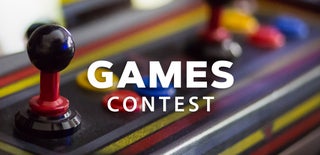Introduction: Car Game for Arduino
Here we ave one more game for arduino .
this game is inspired on a vintage electronic game ,on this game you need to drive one car on a autoroute full of trucks you can't crash in anyone ,if you do it the games over and show you how many time you drive for a new game you reset the arduino.
Supplies
- Arduino
- breadboard
- Jumpers
- 220R resistor
- 10k variable resistor
- 16x2 LCD screen
- piezo buzzer
- USB cable to program arduino
Step 1: Shcematic:
Wire the components together.
Step 2: The Code:
Program the Arduino with this code:
/* Simple Car game for a 16x2 LCD display
You can use any Hitachi HD44780 compatible LCD.Wiring explained at http://www.arduino.cc/en/Tutorial/LiquidCrystal
(I used theLCD Electronic Brick on bus 1:
rs on pin 2, rw on pin 3, enable on pin 4,
data on pins 5,6,7,8)
There's also a "steering wheel" potentiometer on analog input 1,
and a Piezo speaker on pin 9 (PWM).
Enjoy,
*/
#include <LiquidCrystal>
// LiquidCrystal display
// You can use any Hitachi HD44780 compatible. Wiring explained at
// http://www.arduino.cc/en/Tutorial/LiquidCrystal
LiquidCrystal lcd(2, 3, 4, 5, 6, 7, 8);
// Steering wheel potentiometer
const int POTPIN = 1;
const int MAXPOT = 800; // no need to turn the wheel all the way to 1023 :)
// Piezo speaker
const int SPEAKERPIN = 9;
const int RANDSEEDPIN = 0; // an analog pin that isn't connected to anything
const int MAXSTEPDURATION = 300; // Start slowly, each step is 1 millisec shorter.
const int MINSTEPDURATION = 150; // This is as fast as it gets
const int NGLYPHS = 6;
// the glyphs will be defined starting from 1 (not 0),
// to enable lcd.print() of null-terminated strings
byte glyphs[NGLYPHS][8] = {
// 1: car up
{ B00000,
B01110,
B11111,
B01010,
B00000,
B00000,
B00000,
B00000}
// 2: car down
,{B00000,
B00000,
B00000,
B00000,
B01110,
B11111,
B01010,
B00000}
// 3: truck up
,{B00000,
B11110,
B11111,
B01010,
B00000,
B00000,
B00000,
B00000}
// 4: truck down
,{B00000,
B00000,
B00000,
B00000,
B11110,
B11111,
B01010,
B00000}
// 5: crash up
,{B10101,
B01110,
B01110,
B10101,
B00000,
B00000,
B00000,
B00000}
// 6: crash down
,{B00000,
B00000,
B00000,
B10101,
B01110,
B01110,
B10101,
B00000}
};
const int NCARPOSITIONS = 4;
// Each position is mapped to a column of 2 glyphs
// Used to make sense when I had a 5th position
// where car or crash was drawn as 2 glyphs
// (can't do that since 0 terminates strings),
// so it's kinda silly now, but it ain't broke :)
const char BLANK=32;
char car2glyphs[NCARPOSITIONS][2] = {
{1,BLANK},{2,BLANK},{BLANK,1},{BLANK,2}
};
char truck2glyphs[NCARPOSITIONS][2] = {
{3,BLANK},{4,BLANK},{BLANK,3},{BLANK,4}
};
char crash2glyphs[NCARPOSITIONS][2] = {
{5,BLANK},{6,BLANK},{BLANK,5},{BLANK,6}
};
const int ROADLEN = 15; // LCD width (not counting our car)
int road[ROADLEN]; // positions of other cars
char road_buff[2+ROADLEN]; // aux string for drawRoad()
int road_index;
int car_pos;
// Off-the-grid position means empty column, so MAXROADPOS
// determines the probability of a car in a column
// e.g. 3*NCARPOSITIONS gives p=1/3
const int MAXROADPOS = 3*NCARPOSITIONS;
int step_duration;
int crash; // true if crashed
unsigned int crashtime; // millis() when crashed
const int CRASHSOUNDDURATION = 250;
const char *INTRO1="Trucks ahead,";
const char *INTRO2="Drive carefully";
const int INTRODELAY = 2000;
void setup()
{
crash = crashtime = road_index = 0;
step_duration = MAXSTEPDURATION;
road_buff[1+ROADLEN] = '\0'; // null terminate it
randomSeed(analogRead(RANDSEEDPIN));
for (int i=0; i
lcd.createChar(i+1,glyphs[i]);
}
for (int i=0; i
road[i]=-1;
}
pinMode(SPEAKERPIN,OUTPUT);
analogWrite(SPEAKERPIN,0); // to be on the safe side
lcd.begin(16,2);
getSteeringWheel();
drawRoad();
lcd.setCursor(1,0);
lcd.print(INTRO1);
lcd.setCursor(1,1);
lcd.print(INTRO2);
delay(INTRODELAY);
}
void loop() {
unsigned long now = millis()-INTRODELAY;
if (!crash) {
getSteeringWheel();
crash = (car_pos==road[road_index]);
}
if (crash) {
if (!crashtime) {
crashtime=now;
drawRoad();
// Game over text
// (keep first 2 "crash" columns intact)
lcd.setCursor(2,0);
lcd.print("Crashed after");
lcd.setCursor(2,1);
lcd.print(now/1000);
lcd.print(" seconds.");
}
if ((now-crashtime)
analogWrite(SPEAKERPIN,random(255)); // white noise
}
else {
analogWrite(SPEAKERPIN,0); // dramatic post-crush silence :)
}
delay(10); // Wait a bit between writes
}
else {
int prev_pos = road[(road_index-1)%ROADLEN];
int this_pos = random(MAXROADPOS);
while (abs(this_pos-prev_pos)<2) { // don't jam the road
this_pos = random(MAXROADPOS);
}
road[road_index] = this_pos;
road_index = (road_index+1)%ROADLEN;
drawRoad();
delay(step_duration);
if (step_duration>MINSTEPDURATION) {
step_duration--; // go faster
}
}
}
void getSteeringWheel() {
car_pos = map(analogRead(POTPIN),0,1024,0,NCARPOSITIONS);
}
void drawRoad() {
for (int i=0; i<2; i++) {
if (crash) {
road_buff[0]=crash2glyphs[car_pos][i];
}
else {
road_buff[0]=car2glyphs[car_pos][i];
}
for (int j=0; j
int pos = road[(j+road_index)%ROADLEN];
road_buff[j+1] = pos>=0 && pos
}
lcd.setCursor(0,i);
lcd.print(road_buff);
}
}
Step 3: Download:

Participated in the
Games Contest














